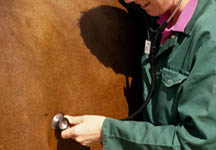BREEDERS are being warned that Britain is ripe for an outbreak of contagious equine metritis (CEM) like the one currently sweeping America.
Twenty-eight states and two in Canada are testing horses for CEM. This follows outbreaks at stud farms in Kentucky and Indiana, with around 400 horses affected.
CEM is a venereal disease that can cause temporary infertility and spontaneous abortions in mares.
Defra has confirmed no horses in the UK are thought to have received infected semen from the US.
But president of the British Equine Veterinary Association (BEVA), Chris House, warns that because British breeders, other than those breeding thoroughbreds, are not compelled to test their animals for CEM or other diseases, the UK is vulnerable to a similar outbreak.
“CEM is a notifiable disease, but, while semen imported into the UK for artificial insemination [AI] and stallions brought into the country are tested for venereal diseases, there is no compulsion for stallions standing here to be tested,” said Mr House.
“We are working with the British Equine Federation [BEF] to create a code of practice similar to that of the Horseracing Levy Board’s and would like all horses to be tested for disease prior to breeding.”
The Horseracing Levy Board’s code of practice for the control of contagious equine reproductive diseases lays down protocols for reducing the risk of CEM, equine viral arteritis (EVA), equine herpes virus (EHV), equine coital exanthema (ECE), equine infectious anaemia (EIA) and strangles.
A BEF spokesman added: “We are in the early stages of setting up a code of practice with BEVA. Awareness [of equine venereal disease] is not as great as it could be.”
The last outbreak of CEM in the UK was in 1985, although in March last year a colt in transit to Australia passing through the UK tested positive for the infection in quarantine.
Read this new story in full in the current issue of Horse & Hound (15 January, ’09)


